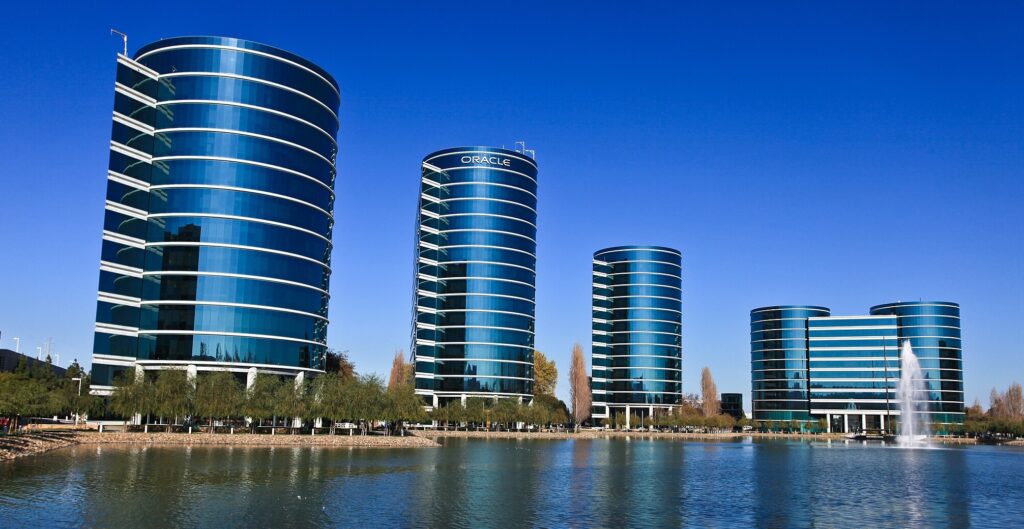Oracle’s bright cloud future hinges on fulfilling massive AI deals

Oracle had a ton of positive news last week with a stellar revenue forecast and big stock market gains, largely driven by news of several contracts including a mega deal with OpenAI. That contract is expected to kick in by 2027, last for five years and be worth up to $300 billion.
Wall Street reacted with gusto, briefly making Larry Ellison the richest man in the world, whatever that designation is worth. But even before last week’s news flurry, the stock was already doing well:
- Up 23% over the last month
- Up 99% over the last 6 months
- Up 84% for the year to date
- Up 83% for the last year
That’s quite a ride, but for a while it seemed like Wall Street was irrationally exuberant about the stock. Last week’s news felt like something more concrete. At least on its face, there was finally some substance behind the rally. Consider that the company projected cloud revenue would rise from $18 billion this year to $144 billion by 2030.
In addition, it announced that RPO (remaining performance obligations) jumped 359% to $455 billion in the most recent quarter. RPO refers to contract bookings that have yet to be recognized as revenue. It’s unclear how much of this revenue will be achieved in the coming years. A lot can happen between now and 2030, but for now the company appears to be in a good position.
The database advantage
While there is plenty of competition in the enterprise database market, Oracle remains a key player. Ellison sees that as a distinct advantage, especially when it comes to AI inference.
“We think we are in a pretty good position to be a winner in the inferencing market because Oracle is by far the world's largest custodian of high-value private enterprise data,” Ellison said in last week’s meeting with analysts after reporting earnings.

What’s more, the company’s new AI database adds another wrinkle. “With the introduction of our new AI database, we added a very important new way for you to store your data in our database,” he said. He says that makes it easy to vectorize the data, which puts the content in a format to make it easier for large language models to understand.
Holger Mueller sees that advantage too, but he cautions it could be too much of a good thing if it ends up booking all this business. Like just about everyone involved in AI, the company is spending big on data centers, but could still run into a capacity problem. Nobody can build fast enough right now to meet the sky-rocketing demand. “Oracle is sitting pretty, but needs to deliver on data center build-out and deliver for its RPO customers,” Mueller told FastForward. It’s easier said than done.
Oracle is trailing the market
Oracle remains far back in the pack behind the big three – Amazon, Microsoft and Google – when it comes to current cloud revenue, according to Synergy Research, a firm that tracks cloud revenue numbers. That could seem counterintuitive after all the positive Oracle news, but the firm is looking at trailing revenue, not at the possibility of future money.
“All I can say is that if Oracle were to increase its annual cloud infrastructure revenues from $10 billion today to $144 billion in five years time, that would represent a remarkable increase in market share,” Synergy Research's John Dinsdale said. Oracle was among the fastest growing firms last quarter, even if its share of the market remains in single digits.
But Dinsdale remains skeptical until it becomes official revenue. “We seem to be living in a world of hyperbole at the moment. The question I'd be asking is how firm are the actual contractual commitments behind that $500 billion. I don't mean potential sales or potential timelines or verbal/handshake agreements – I mean firm contractual commitments that customers are locked into,” he said.

It’s worth noting that those numbers could be at least partly predicated on the OpenAI contract maxing out, and that’s not a given. As Fierce Network’s Diana Goovaerts reported, it’s likely that the deal comes with contingencies based on a number of factors including minimum usage and renegotiation gates.
In a critical blog post, Ed Zitron was extremely skeptical of the company’s numbers, pointing out that in particular, it's unclear that OpenAI, a company that remains unprofitable, will be able to come up with the money to fulfill these commitments over the life of the contract. An analysis on Sherwood News wondered the same thing, pointing out that OpenAI doesn’t have the cash to pay Oracle (although it left open the possibility that it could raise it on the private markets in the meantime).
All of this is hard to parse at present, but if the projections hold and Oracle can fund the necessary data center build-out, it could bode well for its cloud future. Yet with so much tied to a single customer in OpenAI, a lot of uncertainty still remains in spite of Wall Street’s exuberance.
Featured photo by Grianghraf on Unsplash





